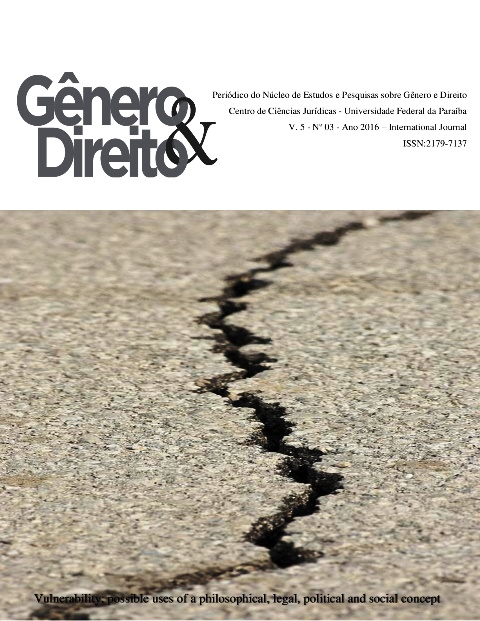LA VULNERABILITE ENTRE HUMANISME ET POST-HUMANISME ANTI-SPECISTE
Palavras-chave:
Vulnerability, animal rights, Jewish thought, ethics of responsibilityResumo
The essay examines some of the major philosophical perspectives which have addressed the theme of vulnerability, with the aim of understanding what kind of ontologies they have produced, and how they have characterised the related ethics. Particular attention is placed on some Authors who, although sometimes very different in relation to their national and cultural backgrounds, share the same Jewish origin: Simone Weil, Emmanuel Lévinas, Hans Jonas and Judith Butler. The essay shows how these Thinkers developed an ethics of responsibility. Special attention is payed to the philosophy of Hans Jonas and the possible links of his thought with the philosophy of animal rights.Downloads
Referências
Adams, Carol J. (1990), The Sexual Politics of Meat. New York: Continuum.
Adams, Carol J. (2000), Ecofeminism and the Eating of Animals: feminism and the defence of animals. Sacramento: Black Powder Press.
Adams, Carol J. et Donovan, Josephine (eds.) (1995), Animals and Women: Feminist Theoretical Explorations, New York: Continuum.
Agamben, Giorgio (1995), Homo sacer. Il potere sovrano e la nuda vita. Torino: Einaudi.
Agamben, Giorgio (2002), L’aperto. L’uomo e l’animale. Torino: Bollati Boringhieri.
Arendt, Hannah (1998), The Human Condition [1958]. Chicago: The University of Chicago.
Antonello, Pier Paolo et Farneti, Roberto (2009), “Antigone’s Claim: A Conversation with Judith Butler”. Theory & Event, 12, 1 (DOI: 10.1353/tae.0.0048).
Arendt, Hannah (1995), Che cos’è la politica?. Milano: Edizioni di Comunità.
Becchi, Paolo (2008), La vulnerabilità della vita. Contributi su Hans Jonas. Napoli: La scuola di Pitagora.
Butler, Judith (1990), Gender Trouble: Feminism and the Subversion of Identity. New York: Routledge.
Butler, Judith (1993), Bodies That Matter: On the Discursive Limits of “Sex”. New York: Routledge.
Butler, Judith (2004), Vite precarie. Contro l’uso della violenza in risposta al lutto collettivo, Roma: Meltemi.
Butler, Judith (2009), Frames of War: When is Life Grievable. London: Verso.
Canguilhem, George (1943), Essai sur quelques problèmes concernant le normal et le pathologique. Clermont-Ferrand: La Montagne.
Casalini, Brunella (2015), “Etica della cura, dipendenza, disabilità”, in http://www.iaphitalia.org/brunella-casalini-etica-della-cura-dipendenza-disabilita/.
de Beauvoir, Simone (2008), Il secondo sesso [1949]. Milano: Il Saggiatore.
Di Nicola, Giulia Paola et Danese, Attilio (2009), Persona e impersonale. La questione antropologica in Simone Weil. Soveria Mannelli (CZ): Rubettino.
Ditadi, Gino (ed.) (1994), I filosofi e gli animali. Vicenza: Isonomia.
Esposito, Roberto (2004), Bíos. Biopolitica e filosofia. Torino: Einaudi.
Esposito, Roberto (2007), Terza persona. Politica della vita e filosofia dell'impersonale. Torino: Einaudi.
Filippi, Massimo et Reggio, Marco (2015), Corpi che non contano. Judith Butler e gli animali. Milano-Udine: Mimesis.
Foucault, Michel (1997), Histoire de la sexualité, I. La volonté de savoir [1976]. Paris: Gallimard.
Foucault, Michel (2004), Naissance de la biopolitique: cours au Collège de France (1978-1979). Paris: Gallimard, Seuil.
Girard, René (1972), La violence et le sacré. Paris: Grasset.
Guaraldo, Olivia (2012), Comunità e vulnerabilità. Per una critica politica della violenza. Pisa: Ets.
Iveson, Richard (2015), Scene domestiche e questione di specie, in Corpi che non contano. Judith Butler e gli animali. Milano-Udine: Mimesis.
Lévinas, Emmanuel (1952), “Simone Weil contre la Bible”. Évidences, 24, fév.-mars: 9-12.
Lévinas, Emmanuel (1971), Totalité et Infini, Essai sur l'extériorité [1961]. La Haye: Martinus Nijhoff.
Lévinas, Emmanuel (1974), Autrement qu'être ou au-delà de l'essence. La Haye: Martinus Nijhoff.
Jonas, Hans (1966), The Fenomenon of Life. New York: Harper & Row.
Jonas, Hans (1993), Il principio responsabilità [1961]. Torino: Einaudi.
Jonas, Hans (1999), Organismo e libertà. Verso una biologia filosofica [1973]. Torino: Einaudi.
Midgley, Mary (1983), Animals and why they matter. Harmondsworth: Penguin Books.
Negri, Antonio (2001), “Il mostro politico. Nuda vita e potenza”, in Desiderio del mostro: dal circo al laboratorio alla politica. Roma: Manifestolibri: 179-210.
Nussbaum, Martha (2007), Le nuove frontiere della giustizia [2006]. Bologna: il Mulino.
Passmore, John (1974), Man's Responsibility for Nature. Ecological problems and western traditions. London: Duckworth.
Regan, Tom (2004), Empty Cages: Facing the Challenge of Animal Rights. Lanham, Md. [u.a.]: Rowman & Littlefield.
Singer, Peter (1975), Animal liberation. A new ethics for our treatment of animals. New York: New York Review Book.
Schopenhauer, Arthur (1993), Il mondo come volontà e rappresentazione [1819]. Roma-Bari: Laterza.
Weil, Simone (1949), L'enracinement: Prélude à une déclaration des devoirs envers l'être humain [1943]. Paris: Éditions Gallimard
Weil, Simone (1955), Réflexions sur les causes de la liberté et de l’oppression sociale [1934]. Paris: Éditions Gallimard.
Weil, Simone (1957), Écrits de Londres et dernières lettres. Paris: Éditions Gallimard.
Vandeveer, Donald (1980), “Animal Suffering”. Canadian Journal of Philosophy, 10, 3: 179-186.
Viola, Francesco (1977), Totalitarismo e irrazionalismo nella teoria morale di Hobbes. Rivista internazionale di filosofia del diritto, 44: 76-132.

